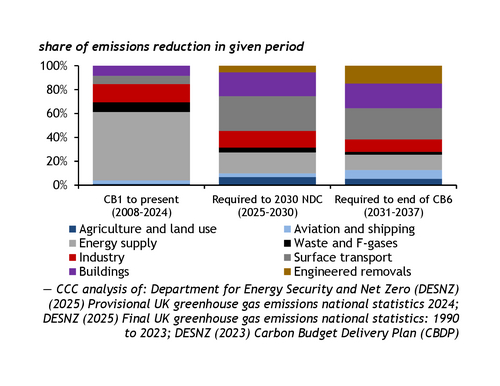The UK's climate plan credibility has improved slightly but no progress has been made to make electricity cheaper, which is key to hit the country's emissions targets, independent advisory body Climate Change Committee (CCC) said in its progress report.
The report assesses the UK's progress towards its net zero goals under the current government, which took power in July 2024. The CCC found the UK's 2050 target remains reachable but climate action needs to accelerate, even though policies to cut greenhouse gas emissions have improved.
Only half of the 16 key indicators assessed by the CCC, with a relevant benchmark or target, are on track — including offshore and onshore wind operational capacity, sustainable aviation fuel, electric vehicle (EV) charging points and distances travelled by car.
EV car sales, heat pump installations, woodland creation and peatland restoration are "slightly off track", while the ratio of electricity to gas prices for households and industries is "significantly off track", the CCC said. The committee noted no progress has been made on actions to lower the cost of power. The government is planning to consult on this "in due course", but CCC urged for actions and timelines.
The CCC has identified "ten priority actions" for the year ahead, with cutting the cost of electricity for households and businesses again at the top. Cheaper power will support industrial electrification and "speed up the uptake of clean electric technologies, such as heat pumps and electric vehicles," the CCC said. The transition to renewables will eventually reduce the country's reliance on volatile wholesale gas prices, which are the main driver of electricity prices, it said.
"But the government can take immediate action to accelerate this by moving policy costs associated with past schemes, and those that are not directly related to the cost of electricity generation, off electricity bills," the CCC said.
Removing electricity policy costs — levied on the unit price of electricity at 20 times the rate of gas — would reduce annual electricity bills by £190 ($258) for a typical household with a gas boiler and by £490 for a typical household with a heat pump, CCC found.
"This would bring UK prices into the range of other countries who are ahead on heat pump roll-out," it said.
The CCC report assessed policy development from July 2024 to 23 May 2025, so does not take into account policies announced in the recent spending review nor the British Industrial Competitiveness Scheme intended to reduce electricity costs by up to £40/MWh for more than 7,000 electricity-intensive businesses.
UK emissions reached 413.7mn t of CO2 equivalent (CO2e) in 2024, including its share of international aviation and shipping, down by 50pc from 1990 and by 2.5pc from 2023, according to the CCC. The year-on-year reductions come mainly from the electricity supply — declining gas generation — and the industry sector.
The government will increasingly need to focus on transport, building, agriculture and aviation to reach its emission reduction targets, the CCC said.
The report points to encouraging trends in EVs and in heat pump installations, which grew by 56pc on the year, and in woodland creations, but it reiterated action on these fronts must accelerate. Although much of the progress stems from policies set by previous government, the CCC said "bold policies" introduced this year are promising, such as removing planning barriers on renewable deployment and the reinstatement of the 2030 phase-out date for gasoline and diesel vehicles.
The market share of new EVs increased on the year in 2024, by nearly 20pc. But CCC noted aviation sector emissions are increasing. The share of sustainable aviation fuel increased to 2.1pc last year from 0.7pc in 2023, but a lot more is required to reach the 10pc SAF mandate by 2030.



